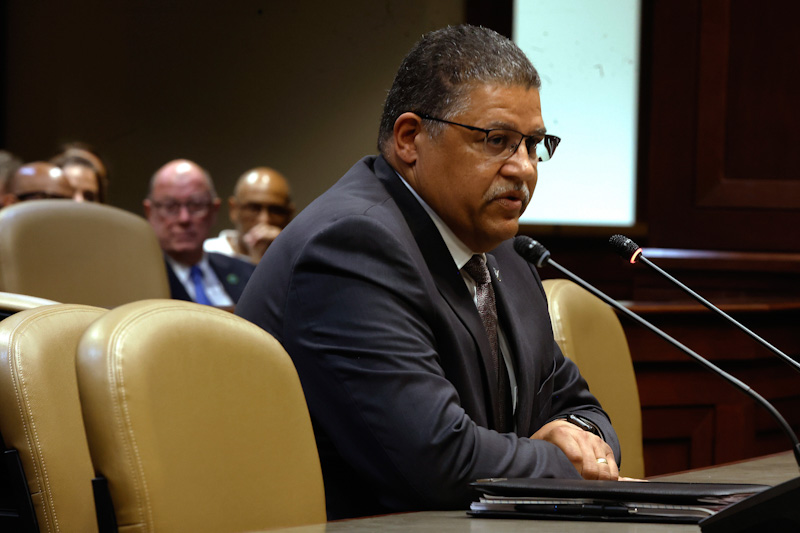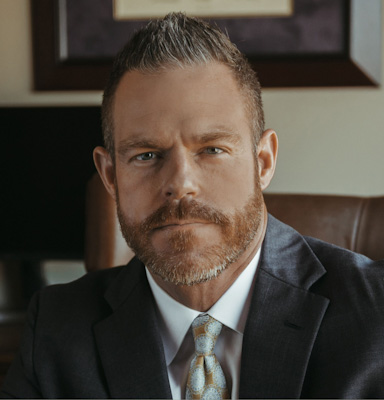'Unlocked' shows how open cells and phone access can help inmates make better choices

Pulaski County Sheriff Eric Higgins answers questions from legislators about the Netflix documentary series “Unlocked: A Jail Experiment” during the Arkansas state legislature’s Joint Performance Review Committee meeting May 14 at the state Capitol in Little Rock, Arkansas. (Photo by Thomas Metthe/The Arkansas Democrat-Gazette via the Associated Press)
When my wife turned on Netflix’s new reality series, Unlocked: A Jail Experiment, I was initially turned off.
The premise that Sheriff Eric Higgins would allow a select pod of his jail at the Pulaski County Regional Detention Facility in Little Rock, Arkansas, to be “unlocked” for six weeks seemed more of a publicity stunt than a social experiment. Sure, there was no promise of unfettered inmate activity, but the notion jailed individuals would be allowed to roam free without law enforcement intervention sounded ridiculous.
I quickly learned guards would continue monitoring the inmates remotely, and only the inmates’ individual cells would be unlocked. That was a novel idea, and the series was fascinating. It fully displays the hostile nature of prisons and jails. Within the experiment, there are only a few instances of violence, and the fights always seem to have some impetus as opposed to being random acts.
And even while various inmates squabble to one degree or another, most mind their own business. Much like on the outside, it’s easy to get into an altercation if you want to, but it’s also not too difficult to stay out of the friction if you prefer.
The series offers real-world facts to support the reasoning behind the experiment, illustrates the difficulties inmates face in custody, and at times draws parallels between people in custody and those outside.
Gladiator school
I remember one of my first clients describing how, due to his advanced age, he couldn’t go back to prison. I explained various medical services inside that would help, but he quickly corrected me: “Prison is gladiator school.”
I knew incarceration could be dangerous, but I never thought of it in the way my client explained. He clarified that if you’re not a fighter, prison will train you to fight; if you are a fighter, prison will train you to fight like your life depends on it. And that makes sense. After all, there are no gloves, headgear or cages (aside from the obvious) to contain the combatants—or, more importantly, to exclude additional combatants.
As the series goes on and a sense of community develops, though, the inmates seem to become less violent and aggressive with each other.
Posturing for position
The best takeaway might be that although the day-to-day life of incarcerated individuals is vastly different from those at liberty, the underlying aspects of finding one’s place in society and maneuvering through its troubles are the same.
Anytime humans are thrust into a situation where society as they know it begins to break down or outright disappear, there are only two things that can happen: Either a new quasi-society develops based on the needs and resources of the constituents, or there is total and complete chaos.
In Unlocked, initially, older inmates attempt to run things—they feel compelled to be role models. The younger inmates take offense to the posturing and structure. The underlying reason for their disapproval isn’t overtly addressed, but it’s easy to assume many inmates lack positive paragons in their lives. And the older inmates are criminals too.
No one wants to be told what to do, which likely led to some individuals’ incarceration. Still, an engaging twist plays out later in the series when some of the younger inmates come to the forefront to help the old guard see their actions in a different light.
Men’s health on display
While jail can easily dehumanize its occupants, it still houses people with hopes, dreams, struggles and trauma. As such, finding one’s groove can ease uncertainty and vexation. In Unlocked, we see inmates ultimately start to fall into a healthy routine even when they are free to carry on as they wish. They work out together, conduct Bible studies and labor through their addiction treatment programs.
Most participants love the program. Not only does the new paradigm give them a sense of worth, but by their admission, it gives them the strength and encouragement to realize they can succeed on the outside as well. A sense of community develops because participants realize it takes them all following rules and agreeing on regulations in order to keep the privileges they’ve received. Just one person could ruin it for everyone.
Additionally, hearing the participants’ conversations as they work to keep the new system in place sheds light on the mental makeup of men in custody. Where Unlocked excels and most other true crime series fail is in the series’ contextual explanations of the situations as they play out on the screen.
This was evident in discussions about granting the participants free access to phones. The sheriff explains that when inmates don’t have access to phones, isolation can quickly turn into depression. Depression can cause a host of outward expressions of anguish that lead to other problems for the individual and the population as a whole. Outside contact can help inmates endure the uncertainty of their existence.
You understand that this is either a sincere explanation from Higgins or a well-crafted answer from a politician.
And participants talk about how everyone in jail is hurting in one way or another. Access to the phones allows them to share the pain with people who care about them. Sometimes, sharing the pain helps them cope.
But the flip side is true too. When someone on the outside won’t answer, that can cause anxiety. Likewise, sometimes when a call is answered, it’s just more bad news.
Nevertheless, it’s refreshing to see the way some of the inmates’ demeanors change after one single phone call with a loved one. Other factors influence the inmates’ attitudes and behaviors as well, but I don’t want to give too much away.
Instead, I sincerely hope others will take an opportunity to check out Unlocked for themselves. Watching the participants work through the situations shows that everyone who loses their way isn’t necessarily lost forever.
Perhaps Higgins put it best—he wants to humanize people and empower them to influence their cultures, environments and communities in a positive way.
“If you can do that on a micro level in jail with people you don’t care about or didn’t initially care about, and if you take that with you when you go to the broader community, then maybe you realize that you are empowered, you can have a positive impact on your neighborhood, on your family,” he told Forbes.

Adam Banner
Adam R. Banner is the founder and lead attorney of the Oklahoma Legal Group, a criminal defense law firm in Oklahoma City. His practice focuses solely on state and federal criminal defense. He represents the accused against allegations of sex crimes, violent crimes, drug crimes and white-collar crimes.
The study of law isn’t for everyone, yet its practice and procedure seems to permeate pop culture at an increasing rate. This column is about the intersection of law and pop culture in an attempt to separate the real from the ridiculous.
This column reflects the opinions of the author and not necessarily the views of the ABA Journal—or the American Bar Association.



